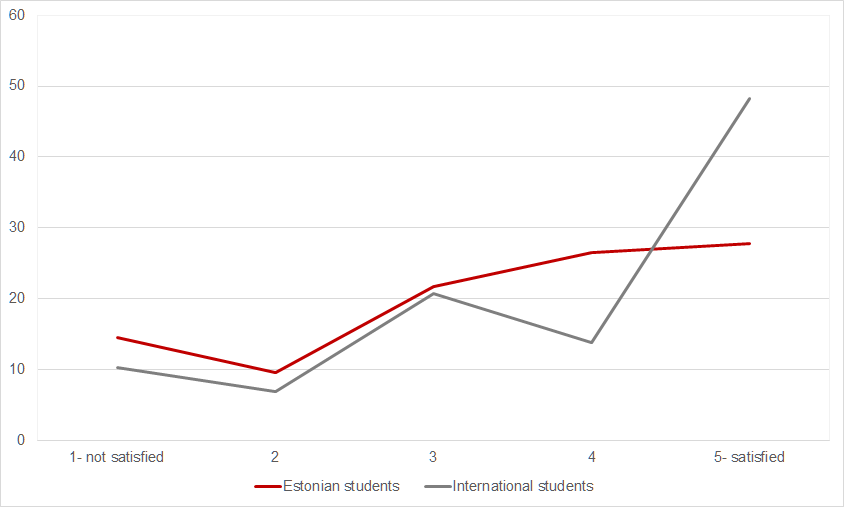Results from ÕIS feedback system
Here you will find overall summaries based on the data from ÕIS system. The page will be updated on an ongoing basis.
Reflections on the experience of the feedback system of ÕIS
I n spring 2020 we carried out a survey to evaluate satisfaction with the feedback system of ÕIS. Below you will find a short summary of the results and proposals.
Graph 1 presents the division of respondents by percentage regarding their satisfaction rate. Answers reflected that there were students who were more or less satisfied, but still gave important feedback that can be used to improve the system.

Table 1 presents the division of respondents based on the reasons behind their evaluations and comments provided by the University.
|
Category |
Percentage of total respondents |
TU comments |
|
Structure of the system (it being compulsory; choice of courses; possibility to complete it on an on-going basis; complexity etc.) |
18% |
Several recommendations were related to the structure of the system and how it functions:
Taking these recommendations into account, we have added a more detailed description of the structure of the feedback system to enable more flexibility to the student. For example, now it possible to choose the courses students wish to provide feedback to. And it is also possible to exclude some questions if they are irrelevant in the context of the course. In addition, the student can only choose to answer open-ended questions. However, as being responsible for the development of the system, we still hope that students want to answer more questions and provide their answers for more than just two courses. The more feedback and responses we have, the better picture we can provide for the academic staff, study programme administrators and for planning developments university-wide. The feedback system is constantly being developed and occasionally we also introduce bigger changes to the system. It is therefore possible that in the future its mandatory nature will change. We admit that there is room for development in case of retrospective questions, which is why we encourage students to take notes about the learning environment supporting their learning is the courses (e.g. in your study notes/file)
|
|
Volume |
15% |
Since the beginning, the priority of the feedback questionnaire has been its content and research-based approach. Based on the analysis of your responses, we review the connections between the statements and hoe they are divided, and we will try to reduce the volume of the questionnaire, making sure that there is no loss in the content and value for the academic staff/administrators of the study programme. We will also try to make sure that different options are understandable to students to avoid situations where students are required to provide feedback about a teacher they have never seen. |
|
Content and choice of questions |
11% |
The questions are based on theoretical approaches to learning support which are applied in educational psychology. One of the biggest challenges is to create a set of questions to fit courses that are very different in their structure. We review the content of the questions before each feedback and consider changes on the basis of proposals. Bigger changes are introduced, if necessary, about every five years (in 2021). |
|
Transparency in using the results |
10% |
The results are used in study programme development and attestation of academic staff. In addition, we also create summary reports, some of these results are also published on our webpage. The developers of the system cooperate with different stakeholders to find possibilities for more effective application of the results. The procedure for providing feedback is being developed, one of its focus points being on increasing the aspect of transparency. |
|
Trustworthiness |
8% |
TU values a feedback system where students can provide substantial feedback without having to worry about its negative effect on their studies. You can read more about the feedback questions and how the system works from HERE. |
|
Wish to publish feedback results |
5% |
We have considered students’ proposal to publish the feedback results. We understand that students would like to have an idea about the prerequisites necessary for taking the course and recommendations as to how to manage the studies in a specific course. On the other hand, we are still careful about publishing the results since we assume that the development of academic staff is constant and methodical. It would be ideal if a lecturer could start the new course with a discussion based on previous feedback about the course and, based on that, make agreements with the students to ensure that the course is successful. However, such system would need time to be implemented and honest, yet constructive, feedback from the students. We therefore have decided not to publish the feedback results but we are considering the possibilities, taking into account the interest of all stakeholders. |